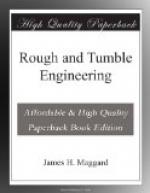Now before dropping the subject of “handy things for an engineer,” I want to say to the engineer who takes pride in his work, that if you would enjoy a touch of high life in engineering, persuade your boss, if you have one, to get you a Fuller Tender made by the Parson’s Band Cutter and Feeder Co., Newton, Iowa, and attach to your engine. It may look a little expensive, but a luxury usually costs something and by having one you will do away with a great deal of the rough and tumble part of an engineers life.
And if you want to keep yourself posted as to what is being done by other threshermen throughout the world, read some good “Threshermen’s Home journal.” The American Thresherman for instance is the “warmest baby in the bunch.” And if anything new under the sun comes out you will find it in the pages of this bright and newsy journal. Keep to the front in your business. Your business is as much a business as any other profession, and while it may not be quite as remunerative as a R. R. attorney, or the president of a life insurance company it is just as honorable, and a good engineer is appreciated by his employer just as much as a good man in any other business. A good engineer can not only always have a job, but he can select his work. That is if there is any choice of engines in a neighborhood the best man gets it.
Something about pressure _________
Now before bringing this somewhat lengthy lecture to a close, (for I consider it a mere lecture, a talk with the boys) I want to say something more about pressure. You notice that I have not advocated a very high pressure; I have not gone beyond 125 lbs. and yet you know and I know that very much higher pressure is being carried wherever the traction engine is used, and I want to say that a very high pressure is no gauge or guarantee of the intelligence of the engineer. The less a reckless individual knows about steam the higher pressure he will carry. A good engineer is never afraid of his engine without a good reason, and then he refuses to run it. He knows something of the enormous pressure in the boiler, while the reckless fellow never thinks of any pressure beyond the I00 or I40 pounds that his gauge shows. He says, “’O! That,’ that aint much of a pressure, that boiler is good for 200 pounds.” It has never dawned on his mind (if he has one) that that I40 pounds mean I40 pounds on every square inch in that boiler shell, and I40 on each square inch of tube sheets. Not only this but every square inch in the shell is subjected to two times this pressure as the boiler has two sides or in other words, each square inch has a corresponding opposite square inch, and the seam of shell must sustain this pressure, and as a single riveted boiler only affords 62 per cent of the strength of solid iron. It is something that every engineer ought to consider. He ought to be able to thoroughly appreciate this almost inconceivable pressure. How many engineers are




